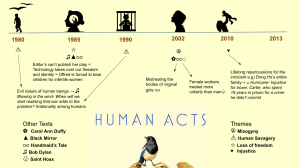
Monthly Archives: September 2021
Human Acts: Extract Essay
Through her novel “Human Acts”, Han Kang returns a voice to the victims and survivors of the 1980 Gwangju Uprising, in which citizens demonstrated against martial law. In the second chapter of her novel, The Boy’s Friend, Han Kang narrates the story from the perspective of Jeong Dae’s soul, who had been shot during the massacre. Through Han Kang’s innovative description and use of senses, she effectively lends Jeong Dae’s body to the reader, allowing them to experience, alongside with him, these initial moments following his death.
To begin with, Han Kang effectively uses descriptions of the sense of touch, enabling the reader to comprehend how being a soul differs from being human. The narrator describes how he felt that “breath-soft slip of incorporeal something” “touch (him)”. Han uses dissonance here as she describes how something “incorporeal” signifying intangible has touched Jeong Dae. Her use of abject creates a sense of confusion and disorder for the reader, as their normal has been subverted, and they therefore cannot fully comprehend what it’s like being in Jeong Dae’s shoes and what life would be like if we were not human. However, it is this sense of abnormality that leaves the reader lingering as they are left eager to understand more about what it feels like to be a soul. She then further describes how we sensed “a physical force, our existence in the mind of the other”. Similarly, Han Kang introduces us to a new world in which such phenomena do not usually occur. The phrase “existence in the mind of the other” creates a sense of familiarity for the reader, given that that humans do in reality exist in the mind of one other, yet it is interesting to view things from such a perspective as we sometimes forget about the little things that make us human. Kang deliberately tries to make the reader understand what it would feel like to be in a new, unknown world, and through the use of senses, which is something common to all human beings, she achieves her purpose of letting the reader feel.
Furthermore, the use of first person narrative throughout this passage further allows the reader to be immersed into the action, permitting them to empathise with Jeong Dae more profoundly. Contrasting with her use of senses, Han includes this literary technique to evoke emotions out of the reader. When Jeong Dae expresses how ” (he) waited for a while in doubt and ignorance”, this elicits a sense of incomprehension and distress considering how, similarly to Jeong Dae, this also builds a sense of confusion for the reader who wouldn’t know what to do in this given situation. This increases emotional proximity the reader and the narrator in allowing them to understand everything in Jeong Dae’s mind at the very moment. Furthermore, the narrator later on describes how “(he eventually) felt (his companion) sigh away, his resignation, his abandonment, left (him) alone gain.” Han Kang effectively includes the rule of three in this phrase which serves as emphasis for Jeong Dae’s desperation for company and his longing to communicate with these souls. The word “eventually” further demonstrates how, despite his efforts in trying to address his “companions”, he ends up back into his initial situation, all “alone again”. This soon transforms into empathy for Jeong Dae, as the reader simultaneously feels lost with the boy, and yearn to return back to the normal world. Han Kang effectively uses this technique to capture the reader’s imagination, allowing them to visualise what life would be like in another world beyond our reality.